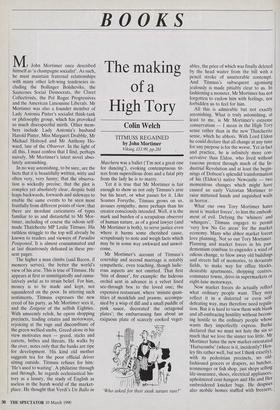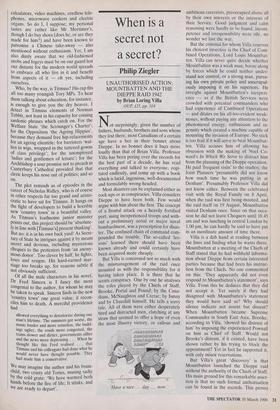BOOKS
The making of a High Tory
Colin Welch
TITMUSS REGAINED by John Mortimer
Viking, £13.99, pp.281
Mr John Mortimer once described himself as 'a champagne socialist'. As such, he must maintain fraternal relationships with many other left-wing tendencies in- cluding the Bollinger Bolsheviks, the Sauternes Social Democrats, the Claret Collectivists, the Pol Roger Progressives and the American Limousine Liberals. Mr Mortimer was also a founder member of Lady Antonia Pinter's socialist think-tank or philosophy group, which has provoked so much disrespectful mirth. Other mem- bers include Lady Antonia's husband Harold Pinter, Miss Margaret Drabble, Mr Michael Holroyd and Mr Anthony Ho- ward, late of the Observer. In the light of all this, I must confess that I find, perhaps naively, Mr Mortimer's latest novel abso- lutely astonishing.
In no way astonishing, to be sure, are the facts that it is beautifully written, witty and often very, very funny; that the observa- tion is wickedly precise; that the plot is complex yet absolutely clear, despite bold leaps backwards, forwards and sideways to enable the same events to be seen most fruitfully from different points of view; that there are mordant caricatures of types familiar to us and distasteful to Mr Mor- timer, including of course the odious self- made Thatcherite MP Leslie Titmuss. His ruthless struggle to the top will already be known to readers and viewers of Paradise Postponed. It is almost consummated and at last disastrously defeated in these pre- sent pages.
The higher a man climbs (said Bacon, if memory serves), the better the world's view of his arse. This is true of Titmuss. He appears at first so unmitigatedly and cumu- latively awful as to strain belief. For him, money is to be made and kept, not squandered on the poor. In uttering such sentiments, Titmuss expresses the new creed of his party, as Mr Mortimer sees it, and the Zeitgeist of the selfish Eighties. With unseemly relish, he opens shopping precincts, trading estates and motorways, rejoicing at the rage and discomfiture of the green-wellied snobs. Greed alone in his view motivates men — greed, sticks and carrots, bribes and threats. He walks by the river, notes only that the banks are ripe for development, His kind old mother suggests tea for the poor official driver sitting outside. Titmuss refuses for him: `He's used to waiting'. A philistine through and through, he regards ecclesiastical his- tory as a luxury, the study of English as useless in the harsh world of the market- place. He thought that Verdi's Un Ballo in Maschera was a ballet (I'm not a great one for dancing'), evoking contemptuous tit- ters from supercilious dons and a fatal pity from the lady he is to marry.
Yet it is true that Mr Mortimer is fair enough to show us not only Titmuss's arse but his heart, or what passes for it. Like Soames Forsythe, Titmuss grows on us, arouses sympathy, more perhaps than his creator consciously intended. Well, it is the mark and burden of a scrupulous observer of human nature, as of a good lawyer (and Mr Mortimer is both), to serve justice even where it harms some cherished cause, scrupulously to note and weigh facts which may be in some way awkward and unwel- come.
Mr Mortimer's account of Titmuss's courtship and second marriage is notably sympathetic, even touching, though ludic- rous aspects are not omitted. That first `bite of dinner', for example: the hideous orchid sent in advance in a velvet lined see-through box to the loved one; the expensive restaurant, where 'minute quan- tities of monkfish and prawns, accompa- nied by a wisp of dill and a small puddle of pink sauce, decorated the octagonal plates'; the embarrassing fuss about an exiguous plate of scarcely cooked veget- `Who asked for their steak tartare rare?' ables, the price of which was finally deleted by the head waiter from the bill with a pencil stroke of unutterable contempt. And Titmuss's subsequent agonising jealously is made pitiably clear to us. In fashioning a monster, Mr Mortimer has not forgotten to endow him with feelings, nor forbidden us to feel for him.
All this is admirable but not exactly astonishing. What is truly astonishing, at least to me, is Mr Mortimer's extreme conservatism — I mean in the High Tory sense rather than in the new Thatcherite sense, which he abhors. With Lord Eldon he could declare that all change at any time for any purpose is for the worse. Yet in fact and practice, he is infinitely more con- servative than Eldon, who lived without raucous protest through much of the In- dustrial Revolution and at least the begin- nings of Dobson's splendid transformation of his (Eldon's) native Newcastle — two momentous changes which might have caused an early Victorian Mortimer to raise mittened hands and anguished wails in horror.
What our own Tory Mortimer hates most is 'market forces', to him the embodi- ment of evil. Defying the 'whiners' and `whingers', Titmuss engages to permit `very few No Go areas' for the market economy. Many who abhor market forces love planning. Not so our Tory Mortimer. Planning and market forces in his pan- demonium combine to engender a wind of odious change, to blow away old buildings and streets full of memories, to devastate fields, to make way for office blocks, desirable apartments, shopping centres, commuter towns, drive-in supermarkets or eight-lane motorways.
Now market forces do actually reflect what ordinary people want. They may reflect it in a distorted or even self- defeating way, may therefore need regula- tion. But it is hard to view them with blank and all-embracing hostility without becom- ing hostile to the ordinary people whose wants they imperfectly express. Burke declared that we must not hate the sin so much that we love the sinner too little. Mr Mortimer hates the new market-orientated `Hartscombe' (where is it, incidently? Hen- ley fits rather well, but not I think exactly), with its pedestrian precincts, no old- fashioned grocers or drapers, no butcher, ironmonger or fish shop, just shops selling life-insurance, shoes, electrical appliances, upholstered coat-hangers and His and Her embroidered knicker bags. He despises also mobile homes stuffed with freezers,
calculators, video machines, cordless tele- phones, microwave cookers and electric organs. So do 1, I suppose; my personal tastes are rather like Mr Mortimer's, though I do buy shoes (does he, or are they made for him?) and have been known to patronise a Chinese take-away — also mentioned without enthusiasm. Yet, I am also dimly aware that we old-fashioned snobs and fogeys must be on our guard lest our distaste for the modern world spreads to embrace all who live in it and benefit from aspects of it — oh yes, including ourselves.
Who, by the way, is Titmuss? His cap fits all too many youngish Tory MPs. To hear them talking about education, for instance, is enough to give you the dry heaves. I detect in Titmuss elements of Norman Tebbit, not least in his capacity for coining sardonic phrases which catch on. For the Welfare State 'the Scrounger's Charter'; for the Opposition 'the Ageing Hippies', because they demand free hip-relacements for an ageing clientele; for barristers 'wal- lies in wigs, wrapped in the tattered gowns of class privilege'; for the unemployed `ladies and gentlemen of leisure'; for the Archbishop a sour promise not to preach in Canterbury Cathedral provided that that cleric keeps his nose out of politics; and so on.
The plot reminds us of episodes in the career of Nicholas Ridley, who is of course in other respects far too grand and aristo- cratic to have sat for Titmuss. It hangs on the fight of developers to build a horrible new 'country town' in a beautiful valley. As Titmuss's loathsome junior minister points out, this project should be 'absolute- ly in line with [Titmuss's] present thinking'. But no: it is in his own back yard! As Secre- tary of State he intrigues against it by means secret and devious, including mysterious cheques to the protesters from 'an anony- mous donor'. Too clever by half, he fights, loses and resigns. His hard-earned mar- riage too breaks up, for reasons subtle if not obviously sufficient. Of all the male characters in his novel, Dr Fred Simcox is I fancy the most congenial to the author, for whom he may be taken to speak. Simcox finds in the new `country town' one great value; it recon- ciles him to death. A merciful providence had
allowed everything to deteriorate during one man's lifetime. The summers got worse, the music louder and more senseless, the build- ings uglier, the roads more congested, the trains slower and dirtier, governments sillier and the news more depressing . . When he thought like this Fred realised . . that Titmuss and his colleagues had done what he would never have thought possible. They had made him a conservative.
We may imagine the author and his brain- child, two crusty old Tories, musing sadly by the cold grate: 'We have warmed both hands before the fire of life; It stinks, and we are ready to depart'.



























































 Previous page
Previous page